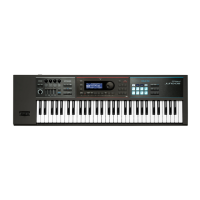5
Patch Mode
Parameter Value/Explanation
Velocity Sens
Oset
Velocity Sens Oset alters the Velocity Sensitivity of the overall patch while
preserving the relative dierences between the Velocity Sensitivity values
set for each tone in the parameters below.
Cuto V-Sens (p. 9)
Level V-Sens (p. 10)
* This value is added to the velocity sensitivity value of a tone, so if the
velocity sensitivity value of any tone is already set to “+63” (maximum),
positive “+” settings here will not produce any change.
-63–+63
Mono/Poly
Species whether the patch will play polyphonically (POLY) or
monophonically (MONO).
The “MONO” setting is eective when playing a solo instrument patch such
as sax or ute.
MONO Only the last-played note will sound.
POLY Two or more notes can be played simultaneously.
Legato Switch
Species whether the Legato Switch will be used (ON) or not (OFF).
With the Legato Switch parameter “ON,” pressing a key while continuing
to press a previous key causes the note to change pitch to the pitch of the
most recently pressed key, sounding all the while. This creates a smooth
transition between notes, which is eective when you wish to simulate the
hammering-on and pulling-o techniques used by a guitarist.
* Legato Switch is valid when the Mono/Poly is set to “MONO.”
OFF, ON
Legato Retrigger
The setting determines whether sounds are replayed (ON) or not (OFF)
when performing legato. Normally you will leave this parameter “ON.”
When “OFF,” when one key is held down and another key is then pressed,
only the pitch changes, without the attack of the latter key being played.
Set this to “OFF” when performing wind and string phrases or when using
modulation with the mono synth keyboard sound.
* Legato Retrigger is valid when the Mono/Poly is set to “MONO” and the
Legato Switch is set to “ON.”
OFF, ON
MEMO
Let’s say you have the Legato Switch set to “ON,” and the Legato Retrigger set to “OFF.” When
you try to sound a legato (by pressing a higher key while a lower key is held down), the pitch
may sometimes not be able to rise all the way to the intended pitch (stopping instead at an
intermediate pitch). This can occur because the limit of pitch rise, as determined at the wave
level, has been exceeded. Additionally, if diering upper pitch limits are used for the waves of
a Patch that uses multiple tones, it may stop being heard in MONO. When making large pitch
changes, set the Legato Retrigger to “ON.”
Portamento
Switch
Species whether the portamento eect will be applied (ON) or not (OFF).
OFF, ON
Portamento Mode
Species the performance conditions for which portamento will be
applied.
NORMAL Portamento will always be applied.
LEGATO
Portamento will be applied only when you play legato (i.e.,
when you press the next key before releasing the previous
key).
Portamento Type
Species the type of portamento eect.
RATE
The time it takes will depend on the distance between the
two pitches.
TIME
The time it takes will be constant, regardless of how far
apart in pitch the notes are.
Portamento Start
When another key is pressed during a pitch change produced by
portamento, a new pitch change will begin. This setting species the pitch
at which the change will begin.
PITCH
Starts a new portamento when another key is pressed while
the pitch is changing.
Pitch
Time
press C4 key
press C5 key
press D4 key
NOTE
Portamento will begin anew from the pitch where the
current change would end.
Pitch
Time
press C4 key
press C5 key
press D4 key
Parameter Value/Explanation
Portamento Time
When portamento is used, this species the time over which the pitch will
change. Higher settings will cause the pitch change to the next note to
take more time.
0–127
Category List
Category Contents
- - - No assign No assign
PNO AC. Piano Acoustic Piano
EP EL. Piano Electric Piano
KEY Keyboards Other Keyboards (Clav, Harpsichord etc.)
BEL Bell Bell, Bell Pad
MLT Mallet Mallet
ORG Organ lectric and Church Organ
ACD Accordion Accordion
HRM Harmonica Harmonica, Blues Harp
AGT AC.Guitar Acoustic Guitar
EGT EL.Guitar Electric Guitar
DGT DIST. Guitar Distortion Guitar
BS Bass Acoustic & Electric Bass
SBS Synth Bass Synth Bass
STR Strings Strings
ORC Orchestra Orchestra Ensemble
HIT Hit&Stab Orchestra Hit, Hit
WND Wind Winds (Oboe, Clarinet etc.)
FLT Flute Flute, Piccolo
BRS AC. Brass Acoustic Brass
SBR Synth Brass Synth Brass
SAX Sax Sax
HLD Hard Lead Hard Synth Lead
SLD Soft Lead Soft Synth Lead
TEK Techno Synth Techno Synth
PLS Pulsating Pulsating Synth
FX Synth FX Synth FX (Noise etc.)
SYN Other Synth Poly Synth
BPD Bright Pad Bright Pad Synth
SPD Soft Pad Soft Pad Synth
VOX Vox Vox, Choir
PLK Plucked Plucked (Harp etc.)
ETH Ethnic Other Ethnic
FRT Fretted Fretted Inst (Mandolin etc.)
PRC Percussion Percussion
SFX Sound FX Sound FX
BTS Beat&Groove Beat and Groove
DRM Drums Drum Set
CMB Combination Other patches which use Split and Layer

